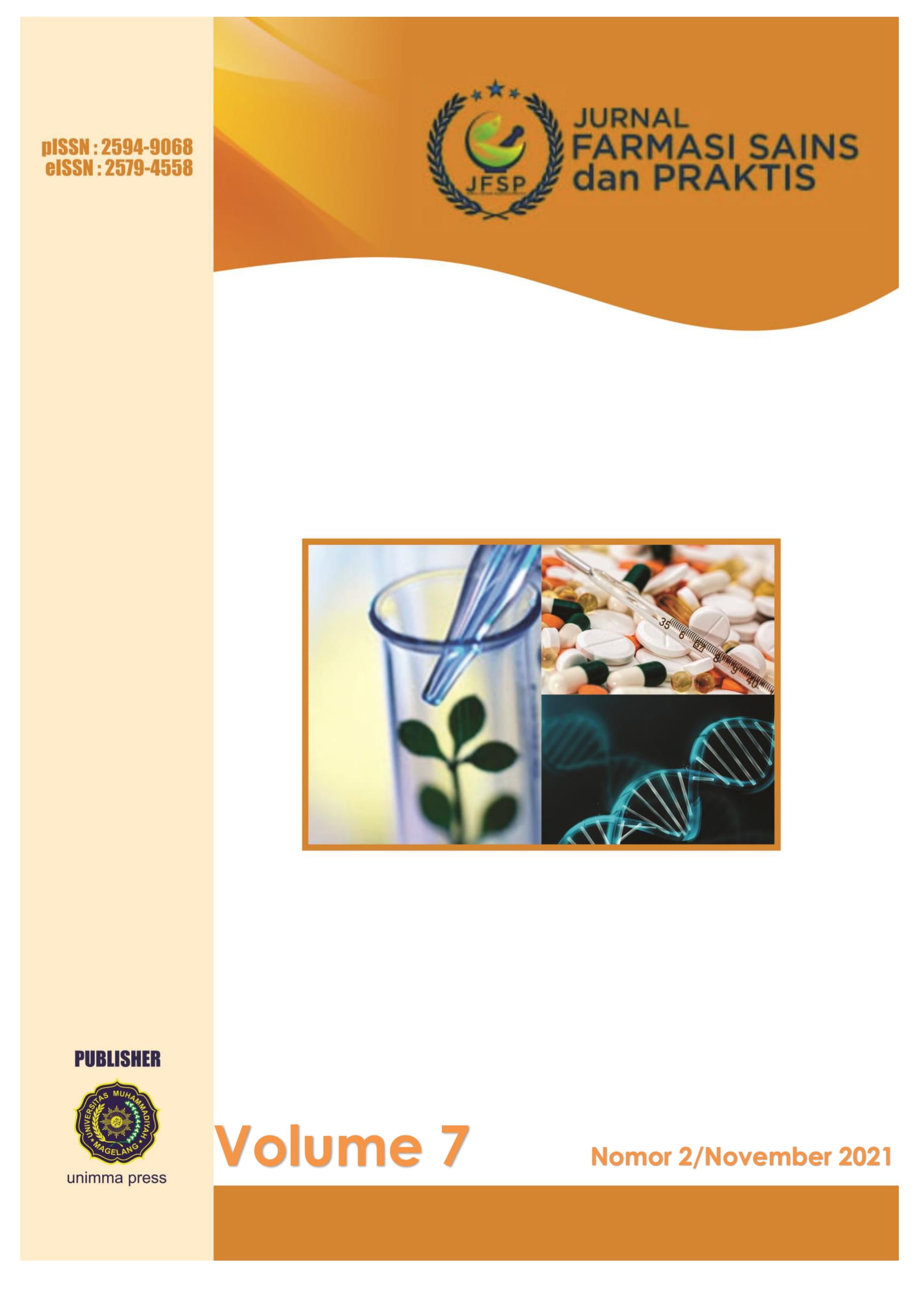Main Article Content
Abstract
Crinum asiaticum L. leaves is a plant that has a pharmacological effect, which
is to relieve pain. The purpose of this study was to determine the effect of the
ethanol extract of daffodils as an analgesic effect on male mice DDY. The
extract was obtained through the maceration extraction method and was
administered by oral administration with three dose variations, namely 200
mg/kg BW, 400 mg/kg BW, and 800 mg/kg BW. Ibuprofen 52 mg/kgBW was
used as a positive control and Na-CMC 0,5% as a negative control. 30 minutes
after induced with 1% acetic acid the amount of stretching was observed every
5 minutes to 60 minutes. The results showed the best analgesic effect at dose III
800 mg/kg BW with the percentage of analgesic protection of 80,66%. The
results of effectiveness at dose III 800 mg/kg BW of 99,37% which is almost the
same as the effectiveness of Ibuprofen at a dose of 52 mg/kgBW of 100%
Keywords
Article Details

This work is licensed under a Creative Commons Attribution-NonCommercial 4.0 International License.
References
- Aike Wemay, M., & Wehantouw, F. (2013). Uji Fitokimia dan Aktivitas Analgesik Ekstrak Etanol Tanaman Kucing-kucingan (Acalypha indica L.) pada Tikus Putih Betina Galur Wistar (Rattus norvegicus L). In PHARMACON Jurnal Ilmiah Farmasi-UNSRAT, 2(3). https://doi.org/10.35799/PHA.2.2013.2314
- Chindo, B., Anuka, J., Isaac, E., Ahmadu, A., Tarfa, F., & Gamaniel, K. (2010). Saponins are involved in the analgesic and anti-inflammatory properties of Ficus platyphylla stem bark. International Journal of Biological and Chemical Sciences, 4(2), 415–423. https://doi.org/10.4314/ijbcs.v4i2.58140
- Choi, E. M., & Hwang, J. K. (2004). Antiinflammatory, analgesic and antioxidant activities of the fruit of Foeniculum vulgare. Fitoterapia, 75(6), 557–565. https://doi.org/10.1016/j.fitote.2004.05.005
- Depkes RI. (1995). Farmakope Indonesia Edisi IV. Depkes RI.
- Depkes RI. (2000). Parameter Standar Umum Ekstrak Tanaman Obat. In Departemen Kesehatan RI (Vol. 1, pp. 10–11). Depkes RI.
- Djamil, R., & Anelia, T. (2009). Penapisan Fitokimia Uji BSLT dan Uji Antioksidan Ekstrak Metanol beberapa Spesies Papilionaceae. Jurnal Ilmu Kefarmasian Indonesia, 7(2), 65–71.
- Ghosal, S., S. Saini, K., & Razdan, S. (1985). Crinum alkaloids: their chemistry and biology. Phytochemistry, 24(10), 2141–2156. https://doi.org/10.1016/S0031-9422(00)83001-0
- J.B.Harborne. (1987). Metode Fitokimia. ITB Press.
- Jinsmaa, Y., Okada, Y., Tsuda, Y., Shiotani, K., Sasaki, Y., Ambo, A., Bryant, S. D., & Lazarus, L. H. (2004). Novel 2′,6′-Dimethyl-L-Tyrosine-Containing Pyrazinone Opioid Mimetic μ-Agonists with Potent Antinociceptive Activity in Mice. Journal of Pharmacology and Experimental Therapeutics, 309(1), 432–438. https://doi.org/10.1124/jpet.103.060061
- Lu, T. C., Ko, Y. Z., Huang, H. W., Hung, Y. C., Lin, Y. C., & Peng, W. H. (2007). Analgesic and anti-inflammatory activities of aqueous extract from Glycine tomentella root in mice. Journal of Ethnopharmacology, 113(1), 142–148. https://doi.org/10.1016/j.jep.2007.05.024
- Md, A. R., S M Azad, H., Nazim, U. A., & Md, S. I. (2013). Analgesic and anti-inflammatory effects of Crinum asiaticum leaf alcoholic extract in animal models. African Journal of Biotechnology, 12(2), 212–218. https://doi.org/10.5897/ajb12.1431
- Meotti, F. C., Luiz, A. P., Pizzolatti, M. G., Kassuya, C. A. L., Calixto, J. B., & Santos, A. R. S. (2006). Analysis of the antinociceptive effect of the flavonoid myricitrin: Evidence for a role of the L-arginine-nitric oxide and protein kinase C pathways. Journal of Pharmacology and Experimental Therapeutics, 316(2), 789–796. https://doi.org/10.1124/jpet.105.092825
- Mirani, Z. A., Fatima, A., Urooj, S., Aziz, M., Khan, M. N., & Abbas, T. (2018). Relationship of cell surface hydrophobicity with biofilm formation and growth rate: A study on Pseudomonas aeruginosa, Staphylococcus aureus, and Escherichia coli. Iranian Journal of Basic Medical Sciences, 21(7), 760-769. https://doi.org/10.22038/ijbms.2018.28525.6917
- Patel, A., Ahmad, A., Khan, M. U., & Hassalai, M. A. A. (2017). Antimicrobial resistance in India. Journal of Pharmaceutical Policy and Practice, 10(1), 1–2. https://doi.org/10.1186/s40545-017-0118-6
- Rauf, A., Haeria, H., & Anas, D. D. (2017). Imunostimulan Fraksi Daun Katuk (Sauropus androgynus L. Merr.) terhadap Aktivitas dan Kapasitas Fagositosis Makrofag pada Mencit Jantan (Mus musculus). Jurnal Farmasi, 4(1), 9–15. https://doi.org/10.24252/.V4I1.2239
- Riris, Ida Duma and Simorangkir, Murniaty and Silalahi, A. (2018). Antioxidant, Toxicity and Antibacterial of Ompu-ompu (Crinum asiaticum-L) Ethanol Extract. RasayanJournal, 11(3), 1229-1235. http://dx.doi.org/10.31788/RJC.2018.1133090.
- Shoaib, M., Shah, S. W. A., Ali, N., Shah, I., Ullah, S., Ghias, M., Tahir, M. N., Gul, F., Akhtar, S., Ullah, A., Akbar, W., & Ullah, A. (2016). Scientific investigation of crude alkaloids from medicinal plants for the management of pain. BMC Complementary and Alternative Medicine, 16(1), 1–8. https://doi.org/10.1186/s12906-016-1157-2
- Tolistiawaty, I., Widjaja, J., Sumolang, P. P. F., & Octaviani. (2014). Gambaran Kesehatan Pada Mencit (Mus musculus) di Instalasi Hewan Coba. Jurnal Vektro Penyakit, 8(1), 27–32.
- Verri, W. A., Vicentini, F. T. M. C., Baracat, M. M., Georgetti, S. R., Cardoso, R. D. R., Cunha, T. M., Ferreira, S. H., Cunha, F. Q., Fonseca, M. J. V., & Casagrande, R. (2012). Flavonoids as anti-inflammatory and analgesic drugs: Mechanisms of action and perspectives in the development of pharmaceutical forms. In Studies in Natural Products Chemistry (36), 297–330. Elsevier B.V. https://doi.org/10.1016/B978-0-444-53836-9.00026-8
